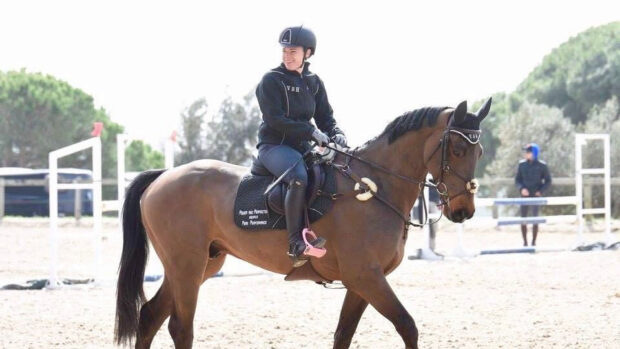Stretch and flexibility are the keys to helping your horse engage his back end to clear fences and the reward comes when you record your first clear showjumping round of the season
It’s never too late to start working on the qualities of stretch and flexibility in your horse by using gymnastic exercises to help your horse improve his engagement.
Equine vet Adele Ronchetti’s 17hh 11-year-old gelding AV Johnny Boy is a perfect example.
Adele and Johnny Boy recorded their first British Eventing victory in a BE100 competition at Smiths Lawn at the beginning of August. Adele attributes her success to the gymnastic exercises they have been doing with trainer Jonathan Chapman.
“Johnny Boy is 17hh so we have been jumping bounce fences on a circle to help his suppleness and engagement behind. It’s certainly paying off as that was our first show jumping clear this season,” explained Adele.
Jonathan describes Johnny Boy as “a genuine horse who will always try for you and, like most middle-aged men, he is just coming into his prime!”
The trio have been working together for 18 months focusing on improving Johnny Boy’s flexibility, co-ordination and engagement.
“We’ve also been working to improve rider control and make Adele consistent in her expectations of him, which allows her to ride more accurately,” Jonathan tells us.
“We do a lot of gymnastic jumping exercises, mostly on circles — 3 small uprights at a bounce distance on a curve.
“Another similar exercise is on a circle with a 1-stride distance between the uprights. Start with the poles on the ground and put them up 1 at a time starting with the last fence in the sequence,” Jonathan continues.
“The key with these exercises is to repeat them on a regular basis, and not to over face the horse either technically or in height. These exercises encourage longitudinal and lateral stretch through the horse and help to develop physical symmetry. They encourage the rider to maintain a rhythm and allow the horse to focus on the fence.”
So what’s next for Adele and Johnny Boy?
“We’ll being working on the development of more gears and more control of the canter, alongside the ongoing physical development of the horse (flexibility and strength). This will allow the combination to tackle the bigger more technical fences encountered at BE novice level.”
We asked Jonathan to tell us a bit about himself and his teaching ethos.
What’s your USP?
Good insight into what a specific partnership needs to work on. The real skill is identifying the root cause of a problem and fixing it, seeing where the potential lies in any horse and/or rider. I’m honest with riders and will tell them what is achievable. I’m disciplined and a good communicator — communication is about understanding. Sometimes instructors say a lot without the rider really understanding what they are seeking to achieve and why. The rider must also communicate well with the horse and this is the foremost thing I work on. There must be a common language between horse and rider, which relies upon clear consistent aids (no nagging) and an appropriate response from the horse.
What’s your pet hate?
Nagging legs and over active hands!
Share with us your signature exercise
The circle exercise described above is something all my students and horses will have done with me. It’s a great exercise to work on the rider’s balance, position and where they are looking while jumping.
What’s the best bit of advice you’ve ever been given?
Yogi Breisner once told me that a good rider should be a benevolent dictator. I always thought that rang true.
If we were to ask your pupils, what would be the one thing they all say you continually shout?
Look where you’re going, breathe and keep your leg still!
To find out more about Jonathan visit www.chapmanequestrian.co.uk. Jonathan runs regular cross-country clinics at Parwood Equestrian Centre, Guildford [www.parwood.co.uk]. The next one is 11 September.
He also organises showjumping clinics at his yard on a weekly basis and can be contacted on 07771 740980.



